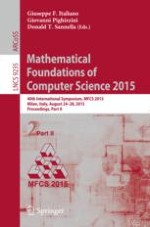2015 | OriginalPaper | Buchkapitel
Metastability of Asymptotically Well-Behaved Potential Games
(Extended Abstract)
verfasst von : Diodato Ferraioli, Carmine Ventre
Erschienen in: Mathematical Foundations of Computer Science 2015
Verlag: Springer Berlin Heidelberg
Aktivieren Sie unsere intelligente Suche, um passende Fachinhalte oder Patente zu finden.
Wählen Sie Textabschnitte aus um mit Künstlicher Intelligenz passenden Patente zu finden. powered by
Markieren Sie Textabschnitte, um KI-gestützt weitere passende Inhalte zu finden. powered by
